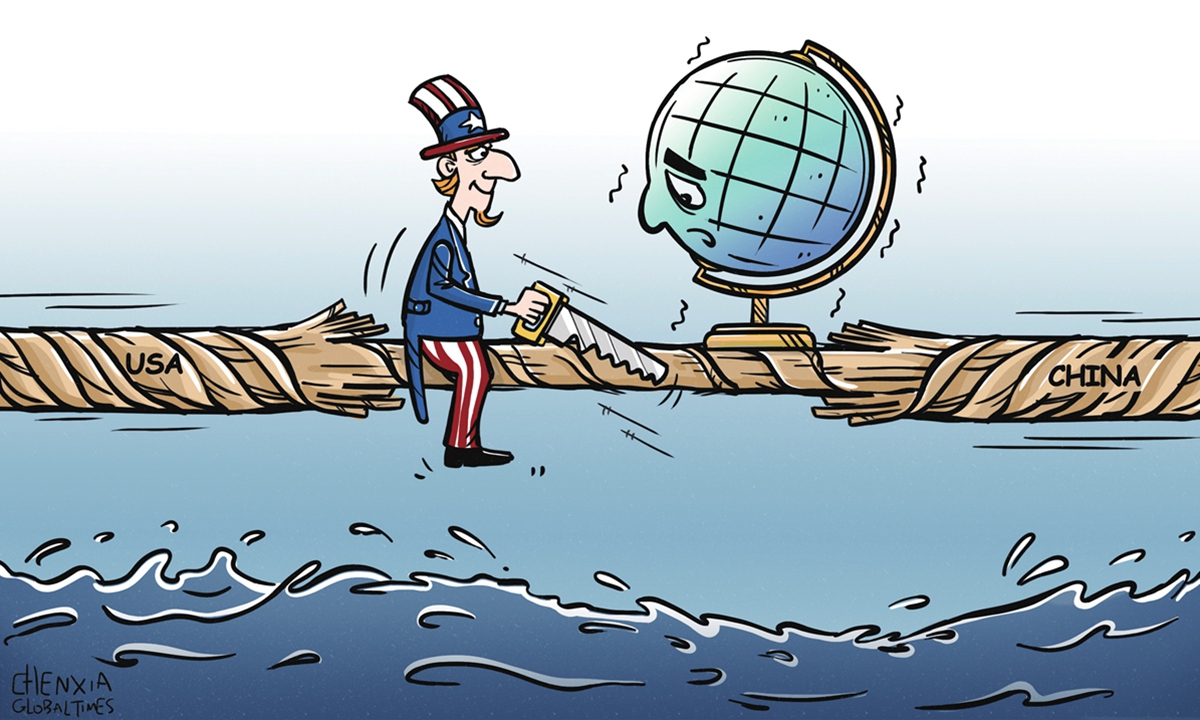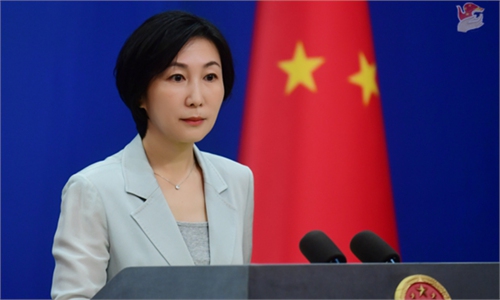
Illustration: Chen Xia/GT
US Treasury Secretary Janet Yellen said Thursday that the US-China economic and financial working groups will continue to have regular meetings, and she plans to visit China for the second time as Treasury Secretary.
At the US-China Business Council's 50th Anniversary Dinner in Washington, she emphasized that the US aims to establish "durable communication channels" with China rather than seek to decouple from China. This is in stark contrast to recent developments in Congress. On Wednesday, some US House of Representatives members proposed four measures to ensure the full implementation of the policy of "decoupling" from China. "The system must be reformed," said the Chairman of The House Foreign Affairs Committee Michael McCaul, a Texas Republican.
This comes shortly after the House Select Committee on the Strategic Competition Between the US and the Chinese Communist Party called for resetting economic ties between the US and China. While not all of the nearly 150 recommendations will become law, it indicates that Washington's policy direction of "decoupling" from China remains unchanged.
There is no apparent disconnect between the White House and Congress regarding China policy, with both aiming to position China as a major competitor.
Yellen's remarks can be seen as more of a "political gesture," suggesting that there is still potential to rebuild communication channels between the two countries. Meanwhile, Congress is focused on enforcing the policy of containing China, emphasizing internal compliance regulation and exerting pressure on the White House.
It's crucial to recognize that US sanctions on China's high technology sectors will become more specific, targeting particular firms and technology levels. While some Chinese companies may be removed from the blacklist, many more could be added to different sanctions lists over time.
The proposal from some US representatives on Wednesday emphasizes systematic reforms within the US system to enhance coordination and enforcement and sever economic and financial ties with China. It suggests encouraging the Bureau of Industry and Security (BIS) and the Departments of Defense and Treasury to synchronize trade restriction lists and require an explanation to Congress if one agency doesn't sanction an entity on another's list.
The BIS is crucial in advancing US national security, foreign policy and economic objectives by ensuring effective export control and treaty compliance, and promoting US leadership in strategic technologies.
In reality, the relevant US administrations, particularly the BIS, have been refining their export control. This will gradually ease the situation for some technology exports to China while imposing precise and stricter restrictions on high-end technologies and products. This kind of refinement will likely have a more significant impact on the future relationship between the two countries.
Following the San Francisco summit, Washington's stance toward Beijing has improved. However, deep-rooted conflicts persist, leaving the outlook for the relationship unclear. As the US approaches the election, Congress is set to reinforce its policy of containing China. It is expected that next year, there will be a continued push for "decoupling," leading to a stumbling communication process between the two governments, and Congress will put even more pressure on China's economic development.
Progress will occur in mutually beneficial areas without major concessions. However, there will still be heated debates over specific businesses and technologies involved in "decoupling." It's evident that as the negative impacts of "decoupling" persist, Washington will gradually play out its hand. Obliviously, some of the politicians in Washington have already felt the change.
What we see in the future is that once the US administrative system puts "decoupling" from China as an important goal of governance, and establishes an operational mechanism within the compliance process, it will gradually create a framework for a new model of China-US relations.
Concurrently, communication between the two sides is ongoing. While a few discussions may not resolve the disputes, the existence of communication suggests the potential for advocating for the concrete interests of both sides. The Chinese side still holds most of the cards, focusing on enhancing bargaining power through coordination and integrating resources to strive for fairer development rights and interests for Chinese companies.


